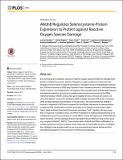| dc.contributor.author | Endres, Lauren | |
| dc.contributor.author | Begley, Ulrike | |
| dc.contributor.author | Clark, Ryan | |
| dc.contributor.author | Gu, Chen | |
| dc.contributor.author | Dziergowska, Agnieszka | |
| dc.contributor.author | Małkiewicz, Andrzej | |
| dc.contributor.author | Melendez, J. Andres | |
| dc.contributor.author | Dedon, Peter C. | |
| dc.contributor.author | Begley, Thomas J. | |
| dc.date.accessioned | 2015-08-20T17:29:27Z | |
| dc.date.available | 2015-08-20T17:29:27Z | |
| dc.date.issued | 2015-07 | |
| dc.date.submitted | 2015-01 | |
| dc.identifier.issn | 1932-6203 | |
| dc.identifier.uri | http://hdl.handle.net/1721.1/98124 | |
| dc.description.abstract | Environmental and metabolic sources of reactive oxygen species (ROS) can damage DNA, proteins and lipids to promote disease. Regulation of gene expression can prevent this damage and can include increased transcription, translation and post translational modification. Cellular responses to ROS play important roles in disease prevention, with deficiencies linked to cancer, neurodegeneration and ageing. Here we detail basal and damage-induced translational regulation of a group of oxidative-stress response enzymes by the tRNA methyltransferase Alkbh8. Using a new gene targeted knockout mouse cell system, we show that Alkbh8-/- embryonic fibroblasts (MEFs) display elevated ROS levels, increased DNA and lipid damage and hallmarks of cellular stress. We demonstrate that Alkbh8 is induced in response to ROS and is required for the efficient expression of selenocysteine-containing ROS detoxification enzymes belonging to the glutathione peroxidase (Gpx1, Gpx3, Gpx6 and likely Gpx4) and thioredoxin reductase (TrxR1) families. We also show that, in response to oxidative stress, the tRNA modification 5-methoxycarbonylmethyl-2′-O-methyluridine(mcm[superscript 5]Um) increases in normal MEFs to drive the expression of ROS detoxification enzymes, with this damage-induced reprogramming of tRNA and stop-codon recoding corrupted in Alkbh8[superscript -/-] MEFS. These studies define Alkbh8 and tRNA modifications as central regulators of cellular oxidative stress responses in mammalian systems. In addition they highlight a new animal model for use in environmental and cancer studies and link translational regulation to the prevention of DNA and lipid damage. | en_US |
| dc.description.sponsorship | National Institute of Environmental Health Sciences (ES002109) | en_US |
| dc.description.sponsorship | National Institute of Environmental Health Sciences (ES015037) | en_US |
| dc.description.sponsorship | National Institute of Environmental Health Sciences (ES017010) | en_US |
| dc.description.sponsorship | Westaway Research Fund | en_US |
| dc.description.sponsorship | David H. Koch Institute for Integrative Cancer Research at MIT (Cancer Research Graduate Fellowship) | en_US |
| dc.description.sponsorship | Howard Hughes Medical Institute (Graduate Fellowship) | en_US |
| dc.description.sponsorship | Singapore-MIT Alliance for Research and Technology | en_US |
| dc.language.iso | en_US | |
| dc.publisher | Public Library of Science | en_US |
| dc.relation.isversionof | http://dx.doi.org/10.1371/journal.pone.0131335 | en_US |
| dc.rights | Creative Commons Attribution | en_US |
| dc.rights.uri | http://creativecommons.org/licenses/by/4.0/ | en_US |
| dc.source | Public Library of Science | en_US |
| dc.title | Alkbh8 Regulates Selenocysteine-Protein Expression to Protect against Reactive Oxygen Species Damage | en_US |
| dc.type | Article | en_US |
| dc.identifier.citation | Endres, Lauren, Ulrike Begley, Ryan Clark, Chen Gu, Agnieszka Dziergowska, Andrzej Małkiewicz, J. Andres Melendez, Peter C. Dedon, and Thomas J. Begley. “Alkbh8 Regulates Selenocysteine-Protein Expression to Protect Against Reactive Oxygen Species Damage.” Edited by Janine Santos. PLoS ONE 10, no. 7 (July 6, 2015): e0131335. | en_US |
| dc.contributor.department | Massachusetts Institute of Technology. Center for Environmental Health Sciences | en_US |
| dc.contributor.department | Massachusetts Institute of Technology. Department of Biological Engineering | en_US |
| dc.contributor.mitauthor | Gu, Chen | en_US |
| dc.contributor.mitauthor | Dedon, Peter C. | en_US |
| dc.relation.journal | PLOS ONE | en_US |
| dc.eprint.version | Final published version | en_US |
| dc.type.uri | http://purl.org/eprint/type/JournalArticle | en_US |
| eprint.status | http://purl.org/eprint/status/PeerReviewed | en_US |
| dspace.orderedauthors | Endres, Lauren; Begley, Ulrike; Clark, Ryan; Gu, Chen; Dziergowska, Agnieszka; Małkiewicz, Andrzej; Melendez, J. Andres; Dedon, Peter C.; Begley, Thomas J. | en_US |
| dc.identifier.orcid | https://orcid.org/0000-0003-0011-3067 | |
| dc.identifier.orcid | https://orcid.org/0000-0001-9920-2080 | |
| mit.license | PUBLISHER_CC | en_US |
| mit.metadata.status | Complete | |
